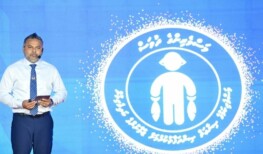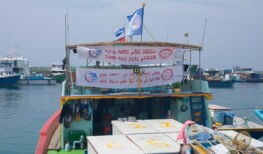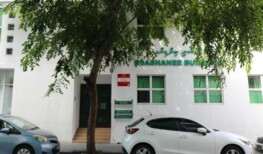Crossing Oceans and Class Barriers: Stories of Education Migration in Maldives
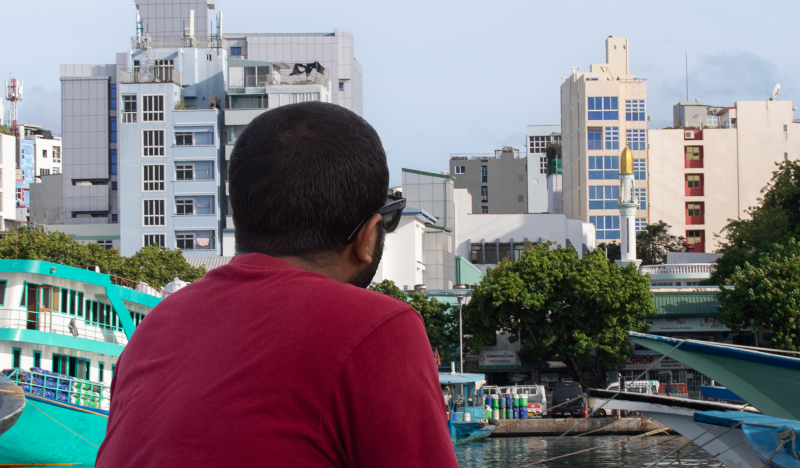
The year-end school holidays of 2002 were a turning point for thirteen-year-old Yoosuf Shiyan*.
Having just completed grade seven, Shiyan was preparing for secondary school on his home island in Haa Dhaalu Atoll. But, the island school only offered commerce streams for secondary grades. His family, relatively well-off for a family living on an island with a population of 1,000, decided to send him off to stay with a distant relative in the capital, Male’ and study at Majeedhiyya School.
Shiyan, the second oldest in a family of five, had shown great promise—he’d finished seventh grade with top marks and aspired to become a prefect, perhaps even the school captain one day. The prospect of moving to Male’ excited him, as he looked forward to studying at Majeedhiyya School, the top boys’ school in the country.
For many families living on remote atolls, sending their young children away for education was not uncommon. Families from smaller islands often sent their children to the best school in the atoll, typically in the atoll capital. Those with means and connections opted to send some of their children even farther, to the capital, Male’.
By the early 2000s, the number of schools across the atolls had increased and primary school was widely accessible. But, many island schools were just beginning to offer secondary and higher secondary education, leaving Male’ as the only place where quality secondary education was guaranteed. This meant that many children like Shiyan still had to uproot their lives and cross the ocean to attend secondary school.
But the reality of studying in Male’ reveals a darker side of classism, servitude and structural inequalities in Maldivian society.
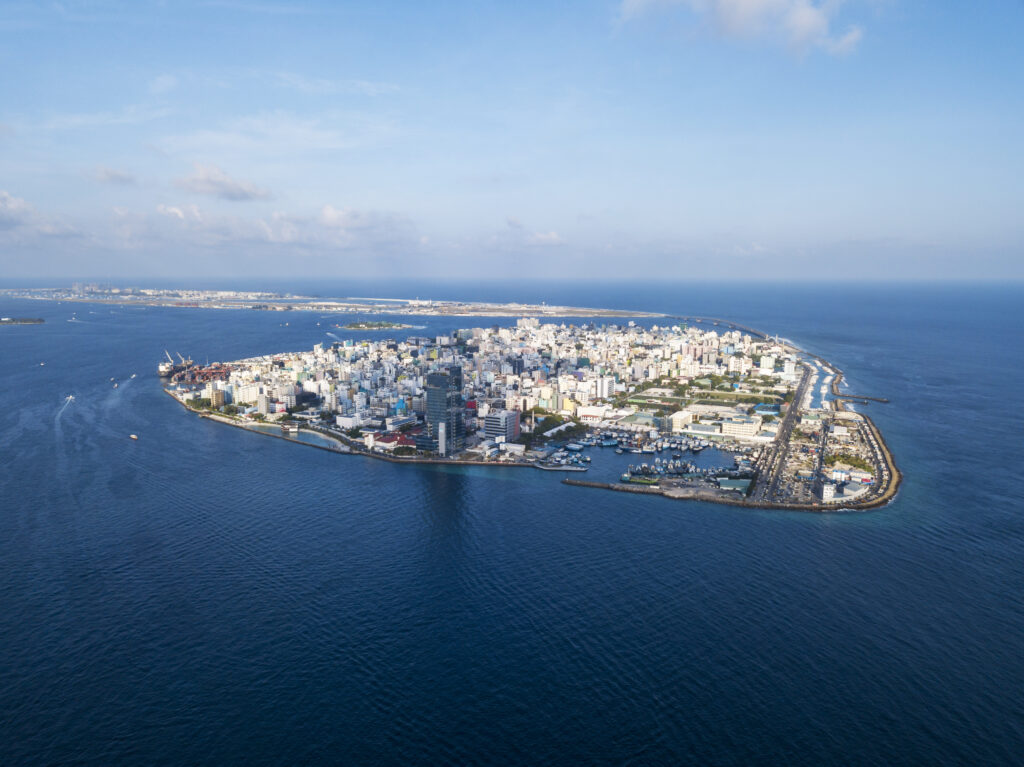
Learning to Live Alone
In 2002, Shiyan got on a boat with his father, crossed five atolls and stepped off onto a Male’ on the cusps of change.
President Maumoon Abdulla Gayoom was preparing for a referendum to secure his sixth and final term as President. The following year would prove crucial for the burgeoning democratic movement in the capital. Male’ was already bursting at the seams from political tensions, rapid urbanisation, and overcrowding. The resident population of Male’ had reached 100,000, crammed into a land area of barely 2 square kilometres.
Migration trends from that time show a steady influx of people from distant atolls like Addu and Huvadhoo in the south and Thiladhunmathi Atolls in the north. Within the first five years of the 2000s, migrants from Raajjethere (the Atolls) gradually outnumbered the registered Male’ population. A significant portion of these migrants, like Shiyan, were between the ages of 10 and 24, moving to the capital in pursuit of better education.
Upon arriving in Male’, Shiyan was taken to his aunt’s house, while his father temporarily slept at the Islamic Centre until the school enrolment was completed. Shiyan sat for the entrance exam to join Majeedhiyya and eagerly awaited the list confirming his enrollment. However, the year 2003 began with the government announcing that students enrolling in Majeedhiyya would be split up, with half allocated to study at Dharumavantha School. Shiyan’s name appeared on the Dharumavantha list.
From the beginning, Shiyan noticed that he was treated differently both at home and at school. He slept on the floor in the boys’ room – which housed 6 people – setting up his bed space only after everyone else had gone to bed.
“Looking back, I had it good then. I didn’t have to do much, but I did notice even then that I received different treatment,” he recalls.
For breakfast, he was given two thick pieces of roshi specifically made for him, while everyone else ate regular roshi. He was assigned specific tasks, like putting away the washed laundry, grocery shopping from the nearby shops, and taking the lid off the rainwater well on rainy days to prevent it from overflowing onto the terrace.
The boys in the house were difficult to get along with, often shooing him away from spare beds when he tried to nap. One boy, in particular, gave him a hard time. He vividly remembers one night of heavy rain that flooded the room. He woke up to the sound of the boys laughing as his mattress became soaked from the incoming water.
“Every time it rained after that, I woke up with a jolt, almost like a survival instinct,” he says, with a dry laugh.
Despite the challenges, Shiyan tried to stay on his best behavior, avoiding confrontation even when provoked. But it wasn’t just home where he felt like he didn’t belong.
At school, he was assigned to the science class with all the top students. He felt like an outsider from day one. Almost overnight, he had gone from being the outspoken, popular kid in his island school to the only Raajjethere kid in a class full of students from prominent Male’ families. He recalls being left out of the honour roll and missing out on becoming a prefect as the batch moved to grade nine.
“All those children from the beyfulhu families, they were all made prefects. But I wasn’t. I was good in Dhivehi, so I got to be the house captain for the literary club, but that didn’t make me a prefect.”
Becoming a prefect was important to him. It was a way to show his mother that he was doing well and making her proud.
“It was very demotivating. I think that was one reason I stopped trying so hard,” he says. “I was a very outgoing, popular student in my island school, but after I came here, there was no one I knew, no friends or family members, so it was lonely… It was scary too because there was a lot of bullying. So I had to be loud and act bad, to defend myself.”
He began standing up for other kids who were bullied, often landing him in trouble and leading to fights with other boys. Teachers started profiling him as a troublemaker, penalising him even when Male’ kids could get away with similar behaviour.
“They used to tell me ‘kids from the atolls are usually very obedient; they come to study, but why are you not like that?” Shiyan recalls. Words like that only made him want to rebel (“Heck no, I don’t want to be obedient!”)
More than anything, he was homesick. Shiyan describes himself as a “mama’s boy,” who, from a young age, loved spending time at home, studying or reading books with the constant support and pampering of his mother.
It was a hard realization when it dawned on him that he was now on his own, half-way across the country, and responsible for taking care of his needs. But what was even harder was only being able to talk to his mother once a month. Mobile phones were a rarity then, especially if you weren’t middle-class. It was difficult to speak to anyone from the landline at home due to the lack of privacy.
“I remember the first parent-teacher meeting—my father was in Male’ at the time, and all the teachers told him I was a very good student. He rushed out of Dharumavantha and called Mom from the phone booth nearby to tell her all about it. That was a happy day.”

Happy days were far and few for Shiyan during those years, but he managed to complete three years of secondary school and sat for his O’Level examinations in 2006. After his exams he left for his island, hoping that he wouldn’t have to return.
“My brother, who’d moved to male’, was the one who went to pick up my results. I was on my island, I didn’t want to come back. I got pretty good grades, a couple of As and Bs.”
The good results meant that there was an expectation for Shiyan to study Alevels. His brother’s new colleagues asked him to bring Shiyan back to Male’ in exchange for a job while studying.
But as it turned out, his aunt said they couldn’t keep him anymore because there wasn’t enough room in the house. Instead, Shiyan moved to Male’ for his A’Levels to stay at a stranger’s home as a Gengulhey Kujjaa.
“Gengulhey Kudhin”
Boarding Gengulhey Kudhin (servant boys/girls) was a common practice among elite Male’ families dating back to the 1950s, an arrangement where teenage children from rural islands were employed as servants in exchange for the promise of a good education.
Many people alive today can recall either being a Gengulhey Kujjaa or living in a household that employed one. While the stories range from heartbreaking struggles to mutually beneficial arrangements, a common thread is the dynamic of a patron-servant relationship between the Male’ elite and rural islanders. The general arrangement was that a Raajjethere Kujjaa would be provided food and board in Male’ in exchange for doing household chores. There was also an underlying expectation that the child’s family on the island would keep sending “gifts” of island goodies to the patron family.
The brilliant Maldivian actor and comedian Yoosay captured this reality in one of his Dhiriulhumakee Meebaa episodes in the 1980s. In a 30-minute documentary, Yoosay plays the part of a young man named Muhammaa from Huvadhoo, who arrives in Male’ with his father, hoping for a better education. Instead, Muhammaa is made to do household chores and faces condescending remarks about his rural origins. His father, shocked to find him working instead of studying, decides to take Muhammaa back to their island, recognising the mistreatment rooted in their status as poor islanders.
The practice of Gengulhey Kudhin has now died out but it highlights the enduring culture of beyfulhism (elitism) and class discrimination that still permeates Male’ society today.
Shiyan was among the last generation of Raajjethere kids who worked as a Gengulhey Kujjaa. While studying for the A’Levels at the Centre for Higher Secondary Education (CHSE), he stayed in a house in Villingili, sleeping on a mattress on the floor once again.
“They were a bit more well-off, so at least I got a more comfortable mattress,” Shiyan recalls.
He was also given a bicycle, but it was only because he is expected to carry the trash to the waste center. This was one of the many chores he was expected to do at the house. His daily routine was gruelling.
“After I wake up, I have to clean everyone’s shoes, clean the TVs and CDs. I would finish cleaning around 10:30. I would then have breakfast and go to Villingili School to pick up their little boy. After that, I would get ready for school and come to Male’ by 12. I would finish school and go home in the evening around 6 pm. I would go home, shower, do homework, and later take out the trash.”
He was also tasked to do shopping for the house, from local shops and the market. On Fridays, he had to clean all the toilets in the house. One of those Fridays was seared into his mind. That morning, he made the mistake of visiting his cousins in Male’ before cleaning the toilets.
“When I came back, they told me, ‘You left before cleaning the toilets, so you won’t get any food before you clean the toilets.“
“So I had to clean the toilets—four toilets. By the time I finished, it was around 2:30 or 3 pm. I hadn’t eaten anything that day.I finished and went to put the cleaning materials in the alleyway behind the house, and I just fainted. I sat down, and I couldn’t get up; I just fell. I regained consciousness a while later, and then I laid there for some time. Then I picked myself up and went and ate. No one knew.”
“I promised myself that day I would spend my entire life working to make sure no other kid would have to go through that again.”
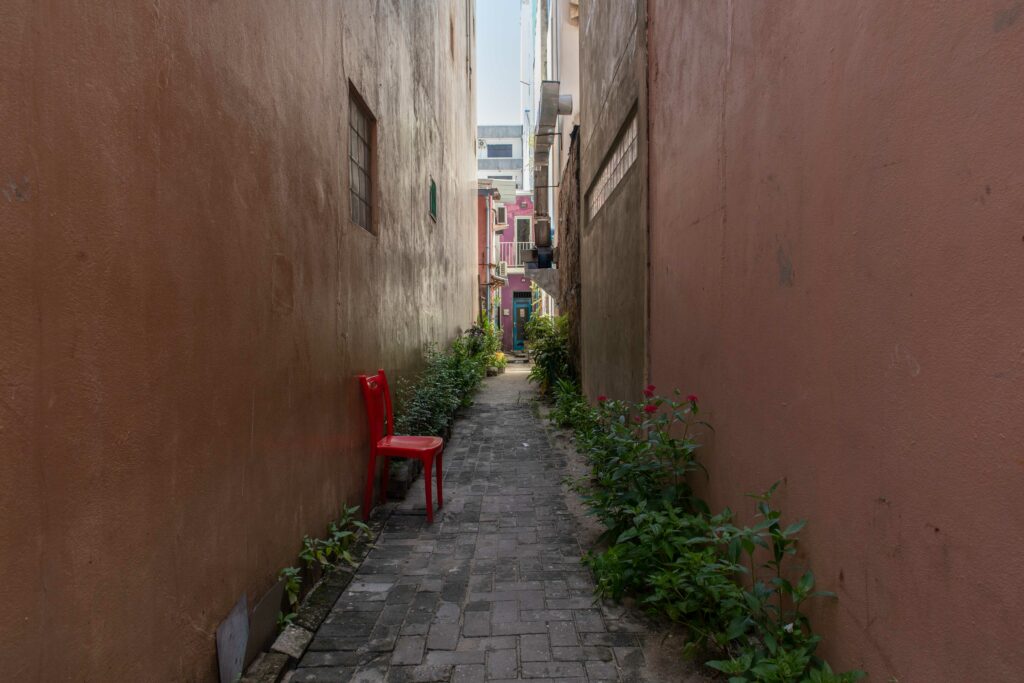
As time went on, things got even more difficult for him at the house.
“They started asking if I was taking things from the shops using their name but I was only getting what their children asked me to get.”
Stealing was one of the things Shiyan’s father had lectured him against when he first moved to Male’. His father drilled into him a deep sense of class consciousness and strong values of honesty and accepting his place in the hierarchy of society.
“He told me many times to never steal, to never eat any food if they didn’t offer it, to never argue. He made me believe that we are poor and lower-class people, so I had to be better. I had to study even if others in the class didn’t study, because they would get land, but I wouldn’t.
It was my father who gave me that class consciousness I kind of blame him for making me feel that way, that I was lesser and poorer, but it’s true, we are different”
So the false accusation of stealing was the final straw for Shiyan, who called his mother and insisted that he move to another house on rent. He and his brother then moved to one of the boarding houses that was starting to crop up in Male’.
Shiyan is quick to point out that his experience is just one among hundreds. Many people, and especially girls who were expected to stay home and do more household chores, face far worse.
“I was the last servant at the house. Before me, there would have been a lot of kids, and I don’t know what they went through. Many kids have faced sexual assault, been raped… I was lucky that I didn’t face any of it. There are a lot of untold stories. How can we know? Kids might even have died… we don’t know.”
The founder of Novelty Publishers, Ali Hussain, hit the nail on the head when explaining the historical prejudice held by Male’ people towards atoll islanders in the third book of his Dhuhthanaa Ivunuaduge Handhaanhuri Bai series.
“Even though it has now faded from Maldivian society now due to widespread education and changes to our lifestyle, ethnic prejudice existed among Maldivians just as much as it was present elsewhere in the world. It was stubbornly maintained, starting from the very top of the government. At the time, Raajjetherey Meehun (atoll people) were considered Beerattehin (strangers). If you were born in the atolls, you are a stranger to Male’ people. Male’ people described islanders as people who never got saltwater sand off their feet. And supposedly if you are an islander you have 5 kulhandhu missing”
Ali hussain, dhuhthanaa ivunu aduge handhaan huri bai 3
Fas Kulhandhu Madhuvun – is a derogatory insult historically aimed at people from the atolls. It implies that a part of their brain (kulhandhu is a local measurement equivalent to 25 madhoshi or 5.8 grams, so precisely 29 grams) is missing.
Ali Hussain, himself born in the atolls, describes how societal and legal policies discriminated against atoll islanders. Marriages between Male’ residents and islanders, especially involving a raajjetherey man and a Male’ woman, were frowned upon. There were also distinctions in dress, behavior, and seating between Male’ people and islanders. Additionally, islanders needed a permit to travel to Male’, which involved a complicated process, including obtaining a letter from the atoll chief, temporary registration, and adherence to strict rules about travel and address changes during their stay.
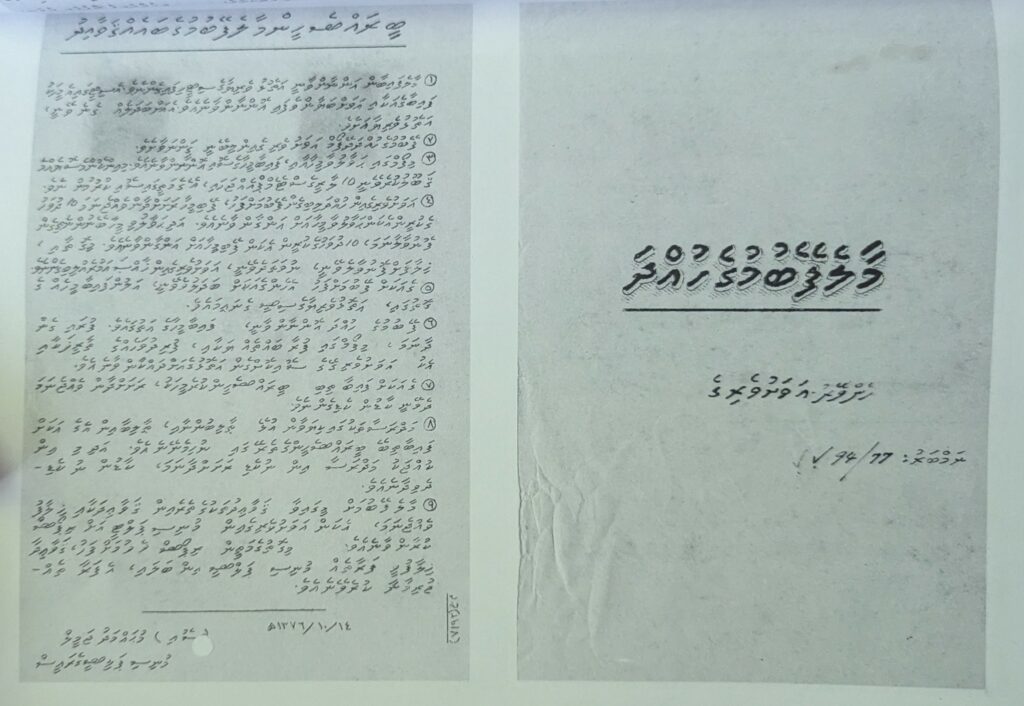
In the book, Ali Hussain explains that most of the atoll people living in Male’ stayed in their handler’s houses as servants. From his memory, he lists some people who worked as Gengulhey Kudhin and went on to study and become notable figures. This includes the writer Madulu Mohamed Waheed and the now famous businessmen and politician Burumaa Gasim Ibrahim
Male’ Privilege and Systemic Inequalities in Education
The practice of Gengulhey Kudhin has now become a thing of the past, but students of all ages migrating to Male’ for education has remained a constant throughout the past two decades.
Education is the top reason for migration to Male’ followed closely by migration to accompany family. A large part of these would account for families who move together to send their kids to school.
Aminath Nadheema’s started school on the island of Naifaru in the 1980s, where she was among the first batch of students at Madhrasathul Ifthithaah, the oldest formal education school in the atolls outside Male’. As a top student, she excelled in her studies, sports, and extracurricular activities.
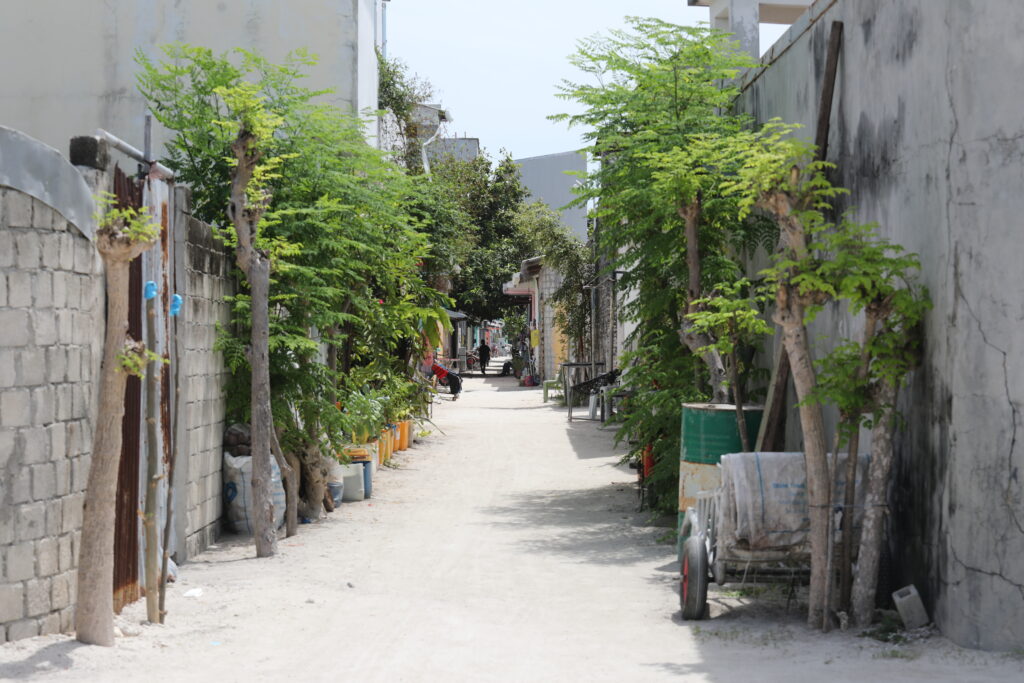
However, the limitations of the island’s education system soon became apparent. After finishing Grade 7 with top grades, Nadheema was forced to repeat the year because the school could not offer Grade 8. The following year, she was required to complete a “Pre-8” class to progress, only to face another setback when she had to repeat Grade 8 due to the absence of Grade 9. Each year of repetition represented not just lost time, but a widening gap between her potential and her opportunities.
At the age of 18, Nadheema left her home and family to move to Male’, where she stayed with a family friend. She considers herself fortunate to have been treated like a daughter by her host, avoiding the heavy household chores that many other girls from the atolls had to endure while trying to study. But, she still had to face more barriers in her education. Her age disqualified her from government schools, forcing her into the private English Preparatory and Secondary (EPS) school. There, she found herself needing to repeat Grade 9 to catch up on art stream subjects she had not studied on her island. The transition to Male’ was an eye-opener for Nadheema, who realized that students in the capital had a higher standard of English and greater access to books and information.
This disparity motivated her to encourage her family to relocate to Male’ so her siblings could benefit from the better educational opportunities available there.
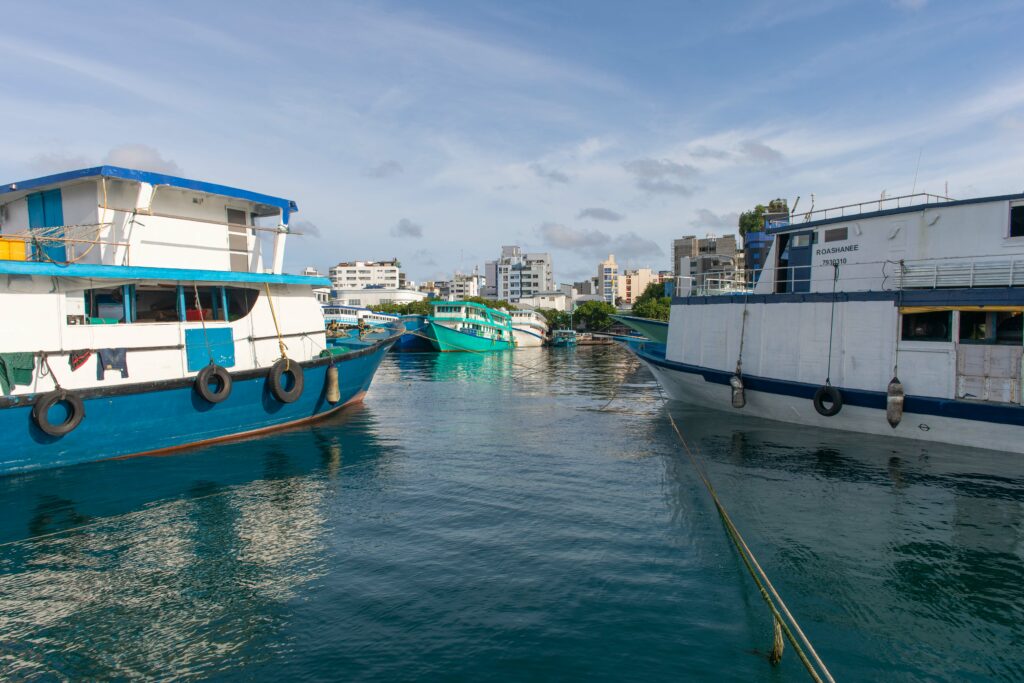
The challenges Nadheema faced in the early 2000s have persisted well into 2020s. For those without family connections in Male’, the options are grim: unregulated boarding houses where six to eight students share cramped rooms with bunk beds stacked to the ceiling, paying MVR 2500-3500 monthly for the privilege.
A study conducted by UNICEF and the Education Ministry in 2015, focused on students who moved to male’ and lived alone or with a guardian. Principals and counsellors reported that children living away from parents suffered from lack of guidance and basic needs. Students interviewed for the study reported being bullied at school and mentioned issues like favoritism, lack of support from school personnel, and academic difficulties.
Girls face additional burdens, expected to balance studies with domestic labor in their host homes. Many, like Rasheeda who moved to Male’ in 2014, cycle through multiple houses during their education – she stayed in three different places during her three-year bachelor’s program alone.
Despite clear evidence of these disparities, government policies continue to exacerbate the divide. As Male’s population expands into the artificial islands of Hulhumale’ and Phase 2, new schools spring up rapidly in the capital region. Meanwhile, island schools struggle for basic necessities – teachers, computer labs, libraries. The numbers tell a stark story: only 59 out of 212 islands offer higher secondary courses, forcing adolescents to either migrate or terminate their education.
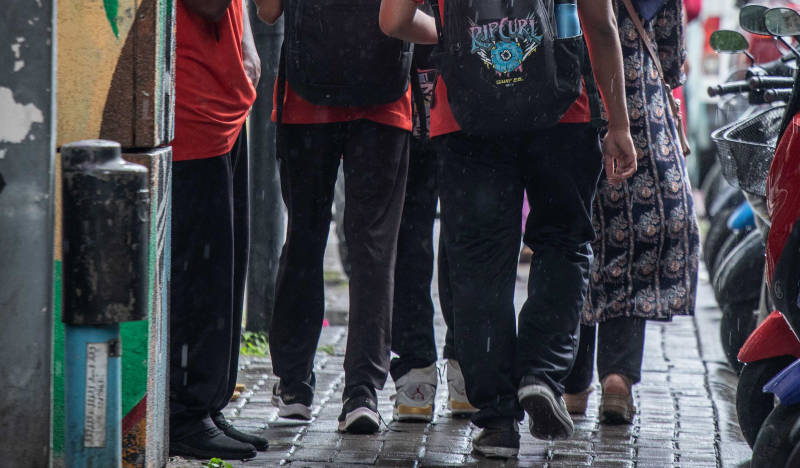
The result is a skewed education system that benefits or disadvantages children based on what development experts call a “geographic lottery” – where a child’s birthplace becomes the strongest predictor of their educational attainment.
There’s number of research highlighting this gap. According to the 2014 UN Human Development Report, a person living in Male’ is likely to complete three more years of schooling than someone living in the atolls. The gaps in years of schooling a person receives is the highest contributing factor to inequality.
Education is the best tool to cross across class barriers, but for most people living in the atolls, education is the barrier.
People like Shiyan and Nadheema, despite their hard-fought struggles after migration, are now more likely to make it into the middle class. They’re also among the few who come from rural origins with the access and opportunity to occupy policy spaces and influence change.
The political landscape of the Maldives is full of leaders from elite families who had the access to education that many people in the atolls did not have. Seven out of the eight presidents in the Maldives studied at Majeedhiyya School in Male’ (the exception is President Mohamed Amin Didi who, although never a student, was the principal of the school between 1946 and 1953).
The current political elite are also more likely to have the means to send their children to study abroad. For many school graduates from the atolls, the only realistic option for higher education is the national university or private colleges run across the country – which, to be fair, has diversified the courses offered in the last decade. Prior to that, many relied on government loans, scholarships, or private wealth to study abroad – chances that were limited to people from the atolls.
Many government offices to this day reject graduates from local colleges in favor of foreign educated graduates. This inevitably means the baton of leadership gets passed on to a generation who – unlike the many graduates from local colleges – have a limited understanding of Maldivian society and the inequalities that exist within.
Fractured Families and Disconnected Communities
For Shiyan, the story of how migration has shaped his life is also about what he had lost.
“I was a mama’s boy growing up, but I’m sad to say I’m no longer close to her,” Shiyan admits , reflecting on the emotional toll of being away from home for so long.
He is acutely aware of how being separated from family at such a young age has affected his entire being. He notices how the isolation of growing up in a place without loved ones has changed his personality and made it difficult for him to form emotional connections.
Migration for education has fractured families and split up communities, leaving many with a sense of disconnection from their loved ones and homeland. This sense of disconnection from family is familiar to many people. Migration to Male’ has isolated and fractured families. Migrants also describe not being able to find a sense of belonging, not in the capital that makes them feel like outsiders, nor in their own communities where that connection has been broken after years of living away.
Aisha Hussain Rasheed captured this deep sense of alienation and loss in her poem (translated) Meedhaa.
Uprooted and taken from the land we grew up in,
Planted here like rootless branches,
No matter how much you water us, we can’t take root in this soil.
We were swimming freely in the open waters around our islands
Until we were scooped up in a net, brought here and put in concrete tanks
Even if you make a hundred artificial beaches, we can’t acclimate to this water
We were running around barefoot in the hot sand,
In the afternoon heat, under the blazing sunlight,
Brought here and forced to walk on the paved roads,
Even in the best quality shoes, our feet still get blistered,….
I went back to the island this break, back home, to my island,
Don’t they say an island will give love to its children like a mother loves her own?
But the soil is a thing that buries, not one that remembers,
After years of staying away trying,
to seek a higher education,
to reach higher positions,
to obtain a higher standard of living,
I went back home and that motherland had forgotten me,
The home we grew up in stood derelict,
a graveyard of childhood memories
….When I went back to my island I realised,
That the island mouse will be stronger in the island.
I came back to Malé and realised
That here, mice are fed rat poison
I am a mouse that belongs neither in the island nor in Malé….
This is not our home,
– Aisha Hussain Rasheed
We and this place, this place and us
We are not of one another
We are mice that belong neither on our island nor in Malé
If not that, who are we?
Note: Above are selected excerpts from Aisha’s poem Meedhaa. You can see the full poem performed by Aisha at the Akurufoshi stage at Katti Hivvaru Festival 2016 on Facebook.
Nudhakkaa Vaahaaka – Things We Don’t Like To Talk About
During our two hour conversation about his story of migration and education, Shiyan acknowledges it’s uncomfortable to recall these moments of his past.
“Us Maldivians, we have this collective mentality of not speaking about things, and if it’s out of sight, it’s out of mind.. We feel shame talking about the difficult things we go through.. I’m thinking about this after a long time, and if i’m being honest, I don’t want to be talking about this now either”
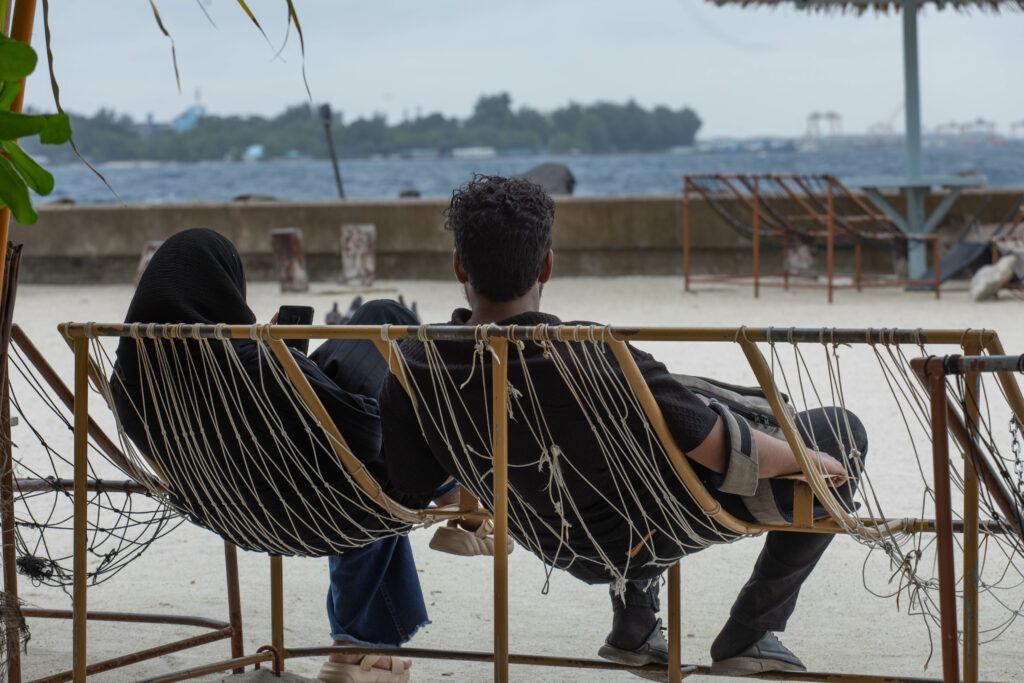
But, he also recognises how silence and accepting the status quo means things don’t change.
“I would go home to my island on holidays, and on the first night back, i would sit with my mother and tell her everything , but it never gets out.. Mom wouldn’t tell anyone, she wouldn’t want me to get kicked out of the house”
Shiyan feels strongly about breaking this culture of silence and speaking up. Feeling like an outsider during the formative years of his life has profoundly shaped Shiyan’s worldview. It made him more outspoken, and instilled in him a strong sense of justice.
“I shared my story once, on twitter.. I remember specifically some accounts and groups of people bullying me just for telling my story.. So I talked to other activists and my friends said to me they don’t deserve to know our stories, they are not even worth it”
But he says it’s important that these stories are told, listened to, and acknowledged. It was one of the issues he felt should have been addressed when the previous MDP administration announced a presidential commission for transition justice.
“I felt that our stories also need to be addressed too, because we had to come and live here like that because of a systematic issue of the state. The first step would be to acknowledge that this was an injustice that a lot of kids had to go through, historically.”
“If we don’t acknowledge it, and refuse to talk about it we are just moving forward with our eyes closed. The rights of a lot of kids are just being lost.”
*Names have been changed
A version of this article appeared in the MV+ 2024 Magazine launched on 14th November 2024. You can read the magazine in full here.




